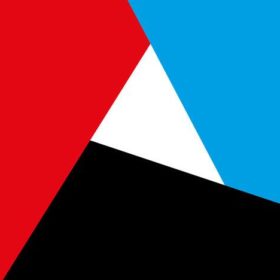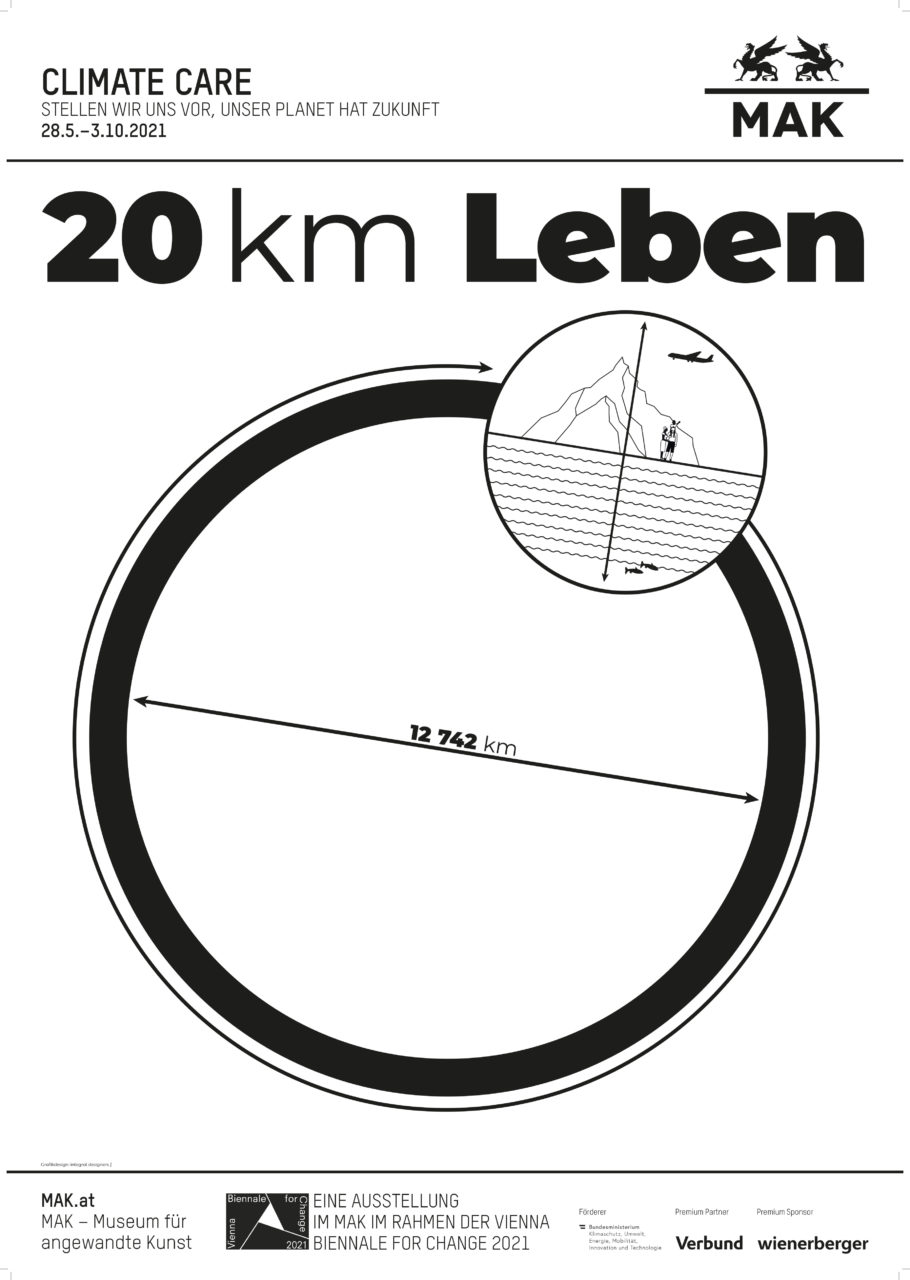
28 May – 3 October 2021 | Vienna Biennale for Change 2021 | MAK – Museum of Applied Arts, Vienna.
MAK – Museum of Applied Arts
The Vienna Biennale for Change 2021 exhibition at the MAK – Museum of Applied Arts recognizes and examines CLIMATE CARE as a key concept and vision for a world that humans share in a just and sustainable way with other species and future generations. It demonstrates through a wide range of art, design, and architecture projects how artists and creative minds can play a central role in shaping an ecologically and socially sustainable Climate Modernity.
Curated by Anab Jain, Hubert Klumpner, Marlies Wirth, Christoph Thun-Hohenstein, with curatorial assistance by Antje Prisker and Melanie Fessel.
Scenography and Communication Design by Ruedi and Vera Baur, Atelier Integral Designers and Institut dix-milliards-humains, Paris.
Research contributions for the Imaginaries section by ETH Zurich, Architecture and Urban Design, Prof. Hubert Klumpner; University of Applied Arts Vienna, Sonderthemen der Architektur, Prof. Anton Falkeis; TU Wien, Urban Design and Landscape Architecture, Prof. Ute Schneider; TU Wien, Architecture and Planning, Dr. Marie Glaser (ETH Wohnforum – ETH CASE), Prof. Sabine Knierbein with the participation of students of the ETH Zurich, University of Applied Arts Vienna, TU Wien.
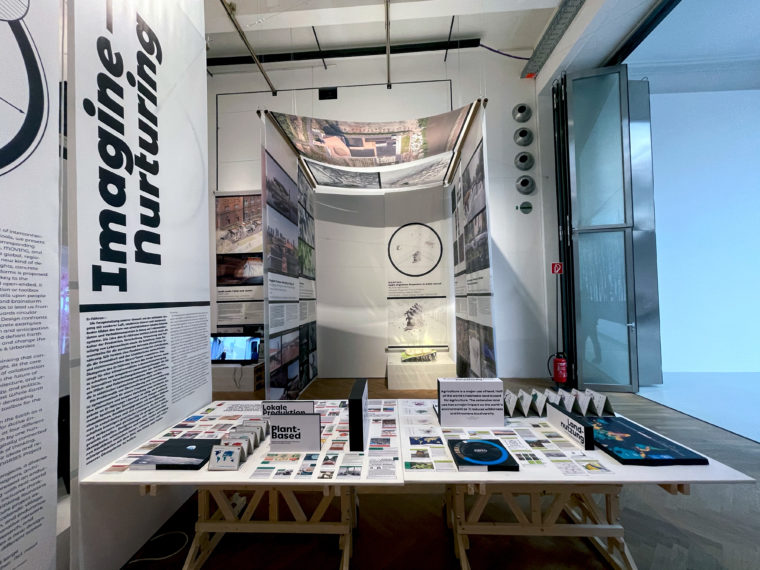
MAK Project Contributions
100 Ideas for Vienna
Chair of Architecture & Urban Design, Prof. Hubert Klumpner, ETH Zurich
What contribution can architecture and urban design make to the climate debate towards the social and ecological transformation of Vienna? Can we co-design spaces that address topics of justice, migration, inclusion, housing, security, mobility, production, work, and the environment? Whilst Vienna ranks first in a global quality-of-life survey, there is also a sense of unease; so not acting on bigger questions is not an option. Nurturing, Dwelling, Moving, and Generating are our thematic drivers, opening up a broader discussion with international participation in Vienna. The Fall of the Iron Curtain in 1989 triggered a process of transformative change in the city. Part of it was the first version of 100 Ideas for Vienna from 1992. Similar projects have since been developed over the years in Caracas, Detroit, Johannesburg, Athens, and Zurich. Today almost 30 years after the first Vienna project, it is about reimagining Vienna with prototypical projects in the context of CLIMATE CARE.
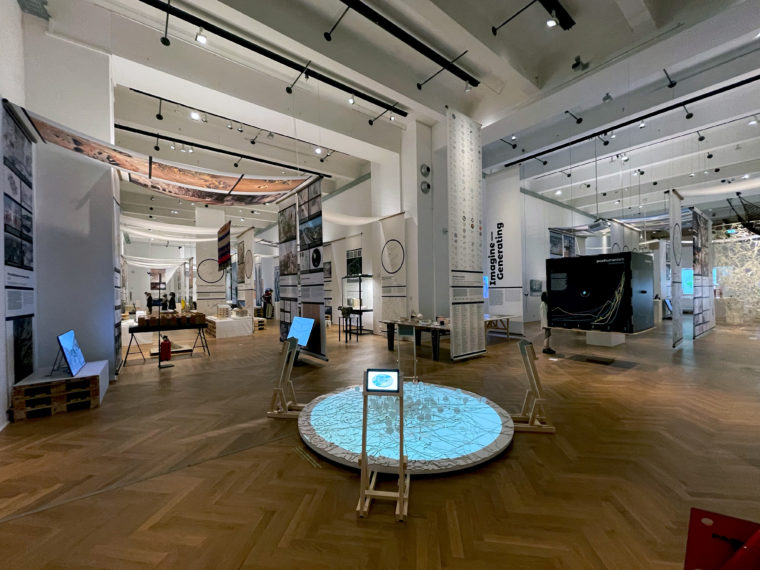
Studio Mobile / Think Tank Station
urbanthinktank_next
Hubert Klumpner, Michael Walczak
2021, the studio mobil / think tank station is back and invites from May to October to a journey imagining a visionary city outdoor-laboratory, engaging ideas around the future of food. By touring the city, taking the streets, performing five sessions with more than 20 partners the studio mobil / think tank station acts as a nomadic outdoor agora. As an alternative form of urban practice the think tank station welcomes people to participate by (re)activating, collecting, and sharing knowledge about food. Presenting workshops, debates, and lectures around alternative food and food spaces as the emerging theme that concerns all of us.
Based on the idea of a gasoline station for the post-fossil age – perhaps one of the most iconic 20th-century purpose-built infrastructures—studio mobil / think tank station provides 24/7 services and infrastructure, including shelter, light, a library, performances, informal encounters, market, and a continuous supply of food for thought, but without gasoline—in short, a large-scale mobile sculpture anchored in public space.
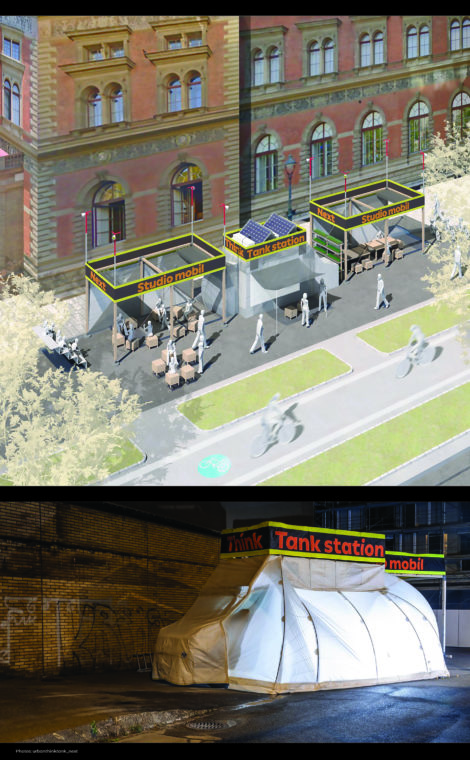
Contributors
Aamodt/Plumb architects, Accattone, Roya Aghighi, A Message From the Future II (Molly Crabapple, Naomi Klein, Avi Lewis & Opal Tometi, directed by Jim Batt & Kim Boekbinder), anti entropy, Architekturbüro Reinberg ZT GmbH Architekturzentrum Wien (Karoline Mayer, Katharina Ritter), Atelier Bow-Wow (Momoyo Kaijima, Yoshiharu Tsukamoto), Atelier Siegrun Appelt (Siegrun Appelt with Constanze Müller), Amy Balkin et al., BauKarussell, Thomas Bayrle, Ludwig Berger, Broken Rules, Bundesforschungszentrum für Wald, Hugo Canoilas, Julian Charrière, Citizen Sense (Jennifer Gabrys), Ciudad Isla/Island City; Ramón Bermúdez & David Kostenwein (UNAL Studierende students), CiViChon Collective, Civic Laboratory for Environmental Action Research (Dr. Max Liboiron, Kaitlyn Hawkins, Grandmother, Dr. Nicole Power), Climate Clock (Gan Golan, Andrew Boyd, Katie Peyton Hofstadter, and Adrian Carpenter), Climeworks, Climoji, Marcus Coates, Company New Heroes, Conceptual Devices (Antonio Scarponi), crafting plastics! studio & OFFICE MMK, Dear Climate (Una Chaudhuri & Marina Zurkow), Agnes Denes, Derman Verbakel Architects (Elie Derman, Els Verbakel), Devenir Universidad + ETH Zurich, Studio Anne Lacaton & Jean-Philippe Vassal (Ursula Biemann, Anne Lacaton, ETHZ students), Mark Dion, DISNOVATION.ORG (Nicolas Maigret & Maria Roszkowska with Julien Maudet, Clémence Seurat, Pauline Briand & Baruch Gottlieb), Nikolaus Eckhard, EcoLogicStudio (Claudia Pasquero, Marco Poletto), Anastasia Eggers / Ottonie von Roeder, Xandra van der Eijk, E-Line Media, Empa/Laboratory of Urban Energy Systems (Kristina Orehounig), EOOS NEXT, Estudio Teddy Cruz + Fonna Forman (Teddy Cruz, Fonna Forman), Extinction Rebellion, Sophie Falkeis, falkeis2architects_building innovation lab (Anton Falkeis & Cornelia Falkeis-Senn), Simone Fattal, Feral Atlas (Anna Lowenhaupt Tsing, Jennifer Deger, Alder Keleman Saxena, Feifei Zhou), Formafantasma, David Freid, Sophie Gogl, Andreas Greiner, Andreas Gursky, Gottfried Haider, Ed Hawkins (University of Reading), Anna Heringer/Martin Rauch, Herobeat Studios, Laurel Hiebert, Marley Javis, Kira Treibergs, Benjamin Hirte, Josef Holzer, Edgar Honetschläger, Michael Höpfner, Independent School for the City in Rotterdam (Michelle Provoost, Wouter Vanstiphout, Mike Emmerik) in collaboration with Dirk, Sijmons, Herman Kossmann & Léa Chénot, Interboro (Georgeen Theodore, Tobias Armborst, Daniel D’Oca), Gudrun Kampl, Johanna Kandl, Samnang Khvay, Johannes Klinglmayr (Linz Center of Mechatronics), Martin Kohout, Brigitte Kowanz, Michał Krawczyk/Giulia Lepori, Nicolás Lamas, Sonia Leimer, Livin Studio, Shahar Livne, Rebecca Mayo, Rahul Mehrotra, Ana Mendieta, Anna Meyer, mischer’traxler studio, Adrien Missika, Mostlikely Architecture, Mutiny Zine, NASA JPL, Camilla Nelson, NODE (Doreen Heng Liu), Officina Corpuscoli/Maurizio Montalti, Precious Plastic Vienna, Maximilian Prüfer, querkraft, Kate Raworth, ReFLEX Orkney, Kim Stanley Robinson, Thomas Romm – Architekturbüro forschen planen bauen, Salvador Rueda, Rural Urban Framework (Joshua Bolchover, John Lin), Julia Schwarz, Merlin Sheldrake, Shigeru Ban Architects (Shigeru Ban), Armando Silva, Smarter Than Car, Klaus Staeck, studio LAUT (Florian Lorenz / Georg Wieser), SUBOTRON (Jogi Neufeld), Superflux, Terreform ONE + X (Melanie Fessel, Mitchell Joachim), The Earth Law Center, The Great Green Wall, Chiara Tommencioni Pisapia, transparadiso (Barbara Holub/Paul Rajakovics), urbanthinktank_next (Hubert Klumpner, Michael Walczak), urbanthinktank_next/Medellín (Alejandro Restrepo-Montoya, Diego Ceresuela-Wiesmann), ustwo games, Sanne Visser, Vollebak, Martin Walde, Kay Walkowiak, Ronald Wall, Christoph Weber, Lawrence Weiner, Thomas Wrede, Min Yoon, Zero Waste Austria, Heimo Zobernig.
Venue
VIENNA BIENNALE FOR CHANGE 2021
PLANET LOVE. CLIMATE CARE IN THE DIGITAL AGE
Fri, 28.05.2021–Sun, 03.10.2021
MAK – Museum of Applied Arts
